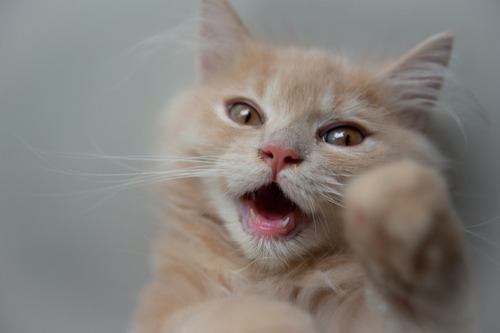Cats have a unique way of communicating with their humans, and yowling is one of their more attention-grabbing vocalizations. While a meow might signal hunger or a greeting, a yowl often suggests something more complex—ranging from discomfort to environmental stress. If your cat’s yowling seems persistent or unusual, pay close attention to their behavior and environment. At Arvada Veterinary Hospital, we can help decode your cat’s vocal cues and address any underlying concerns. Call us at (303) 424-4439 or book an appointment online to ensure your cat stays happy and healthy.
Understanding Cat Yowling
Cats yowl for many reasons, and this unique vocalization serves as a form of communication. Unlike a typical meow, a yowl is usually more intense and signals that your cat is trying to convey something specific. Cats may yowl to express discomfort, seek attention, or alert you to an issue in their environment. Yowling can also vary between breeds and individual cats. Some breeds, like Siamese cats, are naturally more vocal. However, changes in vocal behavior—such as increased or prolonged yowling—can indicate an underlying issue that requires attention.
What Are Some Common Triggers for Cat Yowling?
Attention-Seeking Behavior
Cats are intelligent animals that quickly learn how to get your attention. If your cat yowls frequently when you’re busy, they may be trying to communicate boredom or a desire for interaction. This is particularly common in indoor cats who don’t have as much stimulation as their outdoor counterparts. To address this, ensure your cat has access to toys, scratching posts, and activities that engage their natural hunting instincts. If attention-seeking yowling becomes excessive, it might be worth consulting with a veterinarian to rule out underlying stress or anxiety.
Hunger or Thirst
Yowling is often your cat’s way of demanding food or water, especially if mealtime is delayed or their water dish is empty. Some cats develop a habit of yowling before meals to remind their owners to feed them. If your cat yowls persistently even after eating, there may be a more serious concern, such as digestive discomfort or an issue with their diet. Proper nutrition and regular feeding schedules can reduce mealtime-related yowling.
Medical Reasons Behind Cat Yowling
When a cat begins yowling excessively, it’s important to consider potential medical causes. Cats are skilled at hiding discomfort, so vocalization may be one of the few signs that something is wrong.
Pain or Discomfort
Cats experiencing pain or discomfort may yowl to signal their distress. This could stem from injuries, arthritis, dental issues, or other physical ailments. If your cat suddenly starts yowling without an obvious cause, it’s best to schedule an exam with your veterinarian to rule out medical conditions.
Cognitive Dysfunction in Older Cats
As cats age, they can experience cognitive decline, similar to dementia in humans. This condition, often referred to as feline cognitive dysfunction, can cause confusion, disorientation, and yowling, especially at night. If your senior cat is yowling more frequently, consult with your veterinarian about ways to manage their symptoms and improve their quality of life.
Illness or Disease
Certain illnesses, such as hyperthyroidism, urinary tract infections, or kidney disease, can lead to excessive yowling. Cats with these conditions may also show other symptoms, such as changes in appetite, weight loss, or inappropriate elimination habits. Early diagnosis and treatment are critical in managing these conditions effectively. Contact Arvada Veterinary Hospital at (303) 424-4439 if you notice any concerning changes in your cat’s behavior.
Environmental Factors That Can Trigger Yowling
Cats are creatures of habit, and changes to their environment can lead to stress-induced yowling.
Moving to a New Home
Moving to a new home can be a major stressor for cats, causing them to feel disoriented or anxious. During this transition, it’s common for cats to yowl as they adjust to unfamiliar surroundings. To ease the adjustment, create a safe space with familiar items such as bedding, toys, and a scratching post. Providing comfort and routine can help reduce stress-related vocalizations.
Conflict with Other Pets
If you have multiple pets in your household, your cat may yowl due to territorial disputes or social tension. Cats are territorial by nature and may feel threatened if their space or resources are shared. To manage this, ensure each pet has access to their own food, water, and resting areas. Gradual introductions and positive reinforcement can also help improve relationships between pets.
Behavioral Reasons for Cat Yowling
In some cases, yowling stems from behavioral factors rather than medical or environmental issues.
Mating Behavior
Unspayed or unneutered cats often yowl as part of their mating behavior. Female cats in heat may yowl to attract males, while male cats may vocalize in response. Spaying or neutering your cat can eliminate this behavior and provide additional health benefits. Contact Arvada Veterinary Hospital to discuss spaying or neutering options.
Nighttime Activity
Cats are naturally nocturnal, which means they may be more active and vocal at night. If your cat yowls while you’re trying to sleep, they may be seeking attention or expressing boredom. Providing structured playtime before bed and ensuring your cat has access to food and water overnight can help minimize nighttime yowling.
When Does Cat Yowling Require Veterinary Attention?
While occasional yowling is normal, excessive or sudden changes in vocalization can indicate a problem that requires professional attention. It’s important to observe your cat’s behavior and note any other symptoms, such as changes in appetite, litter box habits, or energy levels. If your cat’s yowling persists despite efforts to address their needs, contact Arvada Veterinary Hospital at (303) 424-4439 or book an appointment online. Our team can help identify the cause and provide appropriate care to ensure your cat’s well-being.
Addressing the Reasons Behind Your Cat’s Vocalizations
If your cat’s yowling has left you searching for answers, it’s clear they’re trying to communicate something important. Whether it’s a medical concern, a behavioral issue, or simply their way of expressing a need, your attention to their vocal cues can make all the difference. The team at Arvada Veterinary Hospital can provide expert care and guidance tailored to your cat’s needs. Call us at (303) 424-4439 or book an appointment online to take the next step in understanding and supporting your feline companion.





